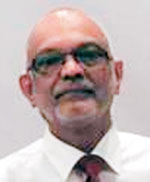Government encourages solar panels on rooftops to overcome power crisis

Lakshman Jayasuriya
The Government is encouraging the public to install solar panels on rooftops and bare lands of houses, religious places, hotels, businesses, factories and cinemas to overcome the burgeoning power crisis. The Ceylon Electricity Board (CEB) is running short of power due to high prices of oil and coal, said Lakshman Jayasuriya, Managing Director of Alpha Thermal Systems (Pvt) Ltd in an interview with the Business Times recently. Mr. Jayasuriya said, “The government is encouraging the use of solar panels in houses and orgnisations to overcome the power crisis”.
Under the ‘Sooriya Bala Sangramaya’ project of the government, every unit of excess power generated from the solar panel which is sent to the national grid, the CEB or the Lanka Electricity Company (Pvt) Ltd (LECO) will pay Rs. 22 per unit for seven years, he added. CEB officials revealed that the government is targetting one million solar power units by 2025. Today 4200 houses, schools, factories and industrialists are using solar panels to generate power.
Public Utilities Commission of Sri Lanka Director General Damitha Kumarasinghe told the Business Times that from all the power generating sources around the country, 3900 megawatts of power can be generated per day whereas one million solar units can generate 4000 megawatts of power every day with less cost and efficiency. Mr. Jayasuriya further explained that the market trends have changed today.
In 2011 the net metering system was introduced to Sri Lanka. At that time solar panels were sold to rural people through bank loans and with the support of the World Bank but this power was not supplied to the national grid. Net metering allows people to reduce the monthly electricity bill by transferring the excess power generated from the solar panel to the national grid which will be credited to the consumer’s account. At the end of the month, the account shows a positive, negative or zero bill depending on the power consumption.
The government has introduced two other methods apart from the existing net metering system. One is similar to that of the net metering system but instead of excess getting credited to your account, the consumer gets paid Rs. 22 per unit for the excess power, a concept called Net Accounting. The other method is you pay your electricity bill separately for the power consumed from the national grid and get paid, separately Rs. 22 per unit for seven years, for the solar energy transferred to the national grid units that you generate from the solar panel.
After seven years payment is at the rate of Rs. 15.50 per unit. These two new methods are an income generation project the government is doing for the public to benefit while bringing down the heavy cost of fuel to produce power from coal, noted Mr. Jayasuriya. He stressed on the fact that there is a need to be very careful about the quality and installation of the solar panel. “Usage of solar panels is one thing we wanted this country to have and now it has come into effect. This is a very encouraging project by the government and incentives are given to banks to provide loan facilities to consumers and earn something out of it,” he said.
He added that solar panels and inverters are duty and VAT free and emphasised that quality products must be used and professionally trained staff to install them. Alpha Thermal Systems (Pvt) Ltd started in 1982 with Solar Water Heating Systems, the first to introduce water heaters in Sri Lanka. Later the company joined with the National Engineering Research and Development Centre and brought Solar Photovoltaic (PV) Electricity Systems into the country.


